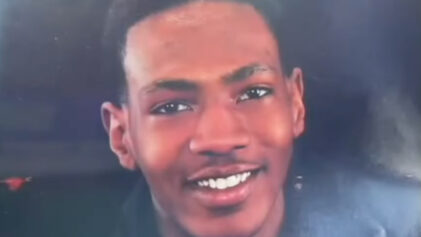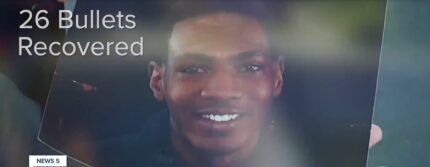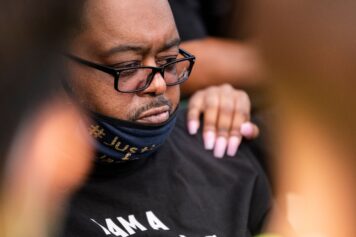The funeral for a Black man Akron police fired at least 80 bullets at and who died after 60 of them riddled his body invoked a painful memory in America’s troubled relationship with race. The man’s family took a page out of civil rights leader Mamie Till-Mobley’s book and showed the public the victim’s minimally unprepped body in an effort to drive home a message that the officers used excessive force when detaining him.
On the morning of Wednesday, July 13, before the body of Jayland Walker was laid in its final resting place, the family hosted a public viewing at 10 a.m. followed by a 1 p.m. funeral at the Akron Civic Theatre on 182 S Main St. in Akron, Ohio.
The service was also live-streamed.
The Akron City Council unanimously voted that his homegoing will also serve as a “Day of Mourning.”
The funeral opened up with an invocational prayer from Bishop Joey Johnson of the House of the Lord.
Presiding over services was Pastor Marlon Walker, a cousin of the deceased. Rev. Walker read acknowledgments, multiple resolutions passed by several government agencies to the assembly, and the obituary. He later returned to give a heartfelt eulogy for his beloved relative.
Bishop Timothy Clarke, a Columbus pastor and the national head of the Church of God, said, “We must not normalize this,” as he talks about the man’s slaying.
“We cannot make the deaths of our sons and daughters at such an early age a normal thing,” Clarke continues. “There is nothing normal about this. We must not try to act as if this is already. This is not all right!”
Walker’s best friend and a Summit County Sheriff’s deputy, Dupri Whatley, tearfully spoke about old times, playing basketball, and listening to music together. He said Walker “loved him some Jada Kiss, some Tupac, some Biggie. He loved it all.”
“I don’t want anybody to make it seem like my best friend was a bad dude,” he said as he tried to hold back tears.
“He’s gonna live through me,” Whatley declared as he struggled to find the words. “I’m never gonna forget him.”
Walker’s older cousin Robin Elerick said he “had the biggest heart” and described him as being “so sweet and so authentically genuine.”
While their uncle, Tom Addie, also commented on how he “was a kind soul with a great heart.”
Approximately 1,000 people who came to pay their final respects said the building was solemn as people viewed Walker’s body.
Pictures of Walker were digitally framed throughout the main auditorium area, and on some monitors family photos were shown.
Some said, according to the Akron Beacon Journal, they could still see some of the wounds from Monday, July 27 — the day the 25-year-old was killed by a maximum of eight different police officers showering the unarmed man in gunshots.
Footage of his death from police bodycam was released by the Akron Police Department on Sunday, July 3, during a press conference, prompting community outrage and civil unrest throughout the city. In response to the protests, Mayor Daniel Horrigan issued a curfew in downtown areas to dissuade potential violence and looting.
On this homecoming morning, there was no riotousness.
Reporter Jim Mackinnon reported that “downtown Akron is largely quiet other than caravan-of-motor vehicles that drove by blowing horns.”
Many in attendance make the comparison to another tragic killing, that of 14-year-old Chicago teen Emmett Till. At his service, his mother chose to allow an open casket — despite her son being grotesquely disfigured after being kidnapped, beat down, killed, and then thrown in a river over 67 years ago for allegedly whistling at a married white woman.
The woman’s husband and a relative were acquitted of his murder by a jury of their peers but later confessed a year later when no legal reprove could punish them.
Circumstances between Walker and Till’s deaths are vastly different. However, issues of race and justice bind them together in the eyes of many.
The family also planned to host a private ceremony after the public sharing and to speak to the press after the 3 p.m. service.
Later in the evening, there will be a series of prayer vigils that will happen from 6 p.m. — 7 p.m. at various community centers throughout the city.
Attorneys for the family requested that the public and media give them privacy for a burial scheduled after the funeral at Greenlawn Cemetery.


